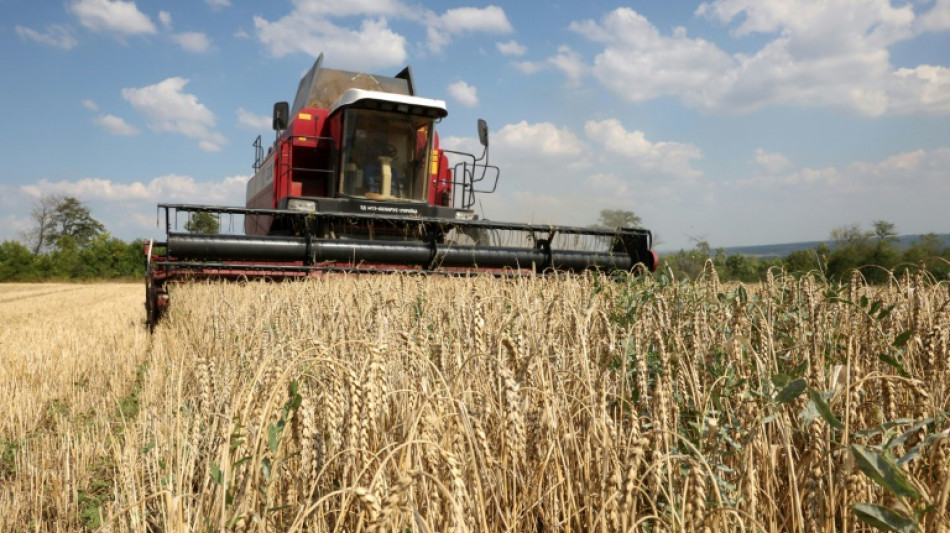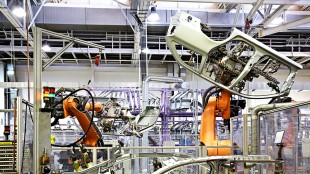
-
 Australia's Green sold for record 252 mn rupees in IPL auction
Australia's Green sold for record 252 mn rupees in IPL auction
-
Elusive December sun leaves Stockholm in the dark

-
 Brendan Rodgers joins Saudi club Al Qadsiah
Brendan Rodgers joins Saudi club Al Qadsiah
-
Thailand says Cambodia must announce ceasefire 'first' to stop fighting

-
 M23 militia says to pull out of key DR Congo city at US's request
M23 militia says to pull out of key DR Congo city at US's request
-
Thousands of glaciers to melt each year by mid-century: study

-
 China to impose anti-dumping duties on EU pork for five years
China to impose anti-dumping duties on EU pork for five years
-
Nepal starts tiger census to track recovery

-
 Economic losses from natural disasters down by a third in 2025: Swiss Re
Economic losses from natural disasters down by a third in 2025: Swiss Re
-
Indonesians reeling from flood devastation plea for global help

-
 Timeline: How the Bondi Beach mass shooting unfolded
Timeline: How the Bondi Beach mass shooting unfolded
-
On the campaign trail in a tug-of-war Myanmar town

-
 Bondi Beach suspect visited Philippines on Indian passport
Bondi Beach suspect visited Philippines on Indian passport
-
Kenyan girls still afflicted by genital mutilation years after ban

-
 Djokovic to warm up for Australian Open in Adelaide
Djokovic to warm up for Australian Open in Adelaide
-
Man bailed for fire protest on track at Hong Kong's richest horse race

-
 Men's ATP tennis to apply extreme heat rule from 2026
Men's ATP tennis to apply extreme heat rule from 2026
-
Cunningham leads Pistons past Celtics, Nuggets outlast Rockets

-
 10-year-old girl, Holocaust survivors among Bondi Beach dead
10-year-old girl, Holocaust survivors among Bondi Beach dead
-
Steelers edge towards NFL playoffs as Dolphins eliminated

-
 Australian PM says 'Islamic State ideology' drove Bondi Beach gunmen
Australian PM says 'Islamic State ideology' drove Bondi Beach gunmen
-
Canada plow-maker can't clear path through Trump tariffs

-
 Bank of Japan expected to hike rates to 30-year high
Bank of Japan expected to hike rates to 30-year high
-
Cunningham leads Pistons past Celtics

-
 Stokes tells England to 'show a bit of dog' in must-win Adelaide Test
Stokes tells England to 'show a bit of dog' in must-win Adelaide Test
-
EU to unveil plan to tackle housing crisis

-
 EU set to scrap 2035 combustion-engine ban in car industry boost
EU set to scrap 2035 combustion-engine ban in car industry boost
-
Australian PM visits Bondi Beach hero in hospital

-
 'Easiest scam in the world': Musicians sound alarm over AI impersonators
'Easiest scam in the world': Musicians sound alarm over AI impersonators
-
'Waiting to die': the dirty business of recycling in Vietnam

-
 Asian markets retreat ahead of US jobs as tech worries weigh
Asian markets retreat ahead of US jobs as tech worries weigh
-
Security beefed up for Ashes Adelaide Test after Bondi shooting

-
 Famed Jerusalem stone still sells despite West Bank economic woes
Famed Jerusalem stone still sells despite West Bank economic woes
-
Trump sues BBC for $10 billion over documentary speech edit

-
 Chile follows Latin American neighbors in lurching right
Chile follows Latin American neighbors in lurching right
-
Will OpenAI be the next tech giant or next Netscape?

-
 Khawaja left out as Australia's Cummins, Lyon back for 3rd Ashes Test
Khawaja left out as Australia's Cummins, Lyon back for 3rd Ashes Test
-
Australia PM says 'Islamic State ideology' drove Bondi Beach shooters

-
 Scheffler wins fourth straight PGA Tour Player of the Year
Scheffler wins fourth straight PGA Tour Player of the Year
-
Tokenwell Plans to Establish U.S. Subsidiary in Dallas, Texas, to Expand its Presence in the Growing Digital Asset Hub

-
 CTT Pharma's Scientists Publish Peer-Reviewed Paper in the Journal of Drug Delivery and Therapeutics
CTT Pharma's Scientists Publish Peer-Reviewed Paper in the Journal of Drug Delivery and Therapeutics
-
Nano One Receives C$10.9M from Financing and Government Programs

-
 WelcomeVille Investment Association With Leadership From Reginald Pembroke Rolls Out a Digital Collaboration Platform
WelcomeVille Investment Association With Leadership From Reginald Pembroke Rolls Out a Digital Collaboration Platform
-
Grande Portage Reports Advancements of Transportation Infrastructure at the New Amalga Gold Project

-
 Genflow Completes Dosing Phase of Canine Gene Therapy Trial
Genflow Completes Dosing Phase of Canine Gene Therapy Trial
-
President Trump Cleaning Up Biden's Marijuana Mess - MMJ Preparing to Move FDA Huntington's Cannabis Trials Forward

-
 Security beefed up for Ashes Test after Bondi shooting
Security beefed up for Ashes Test after Bondi shooting
-
Wembanyama blocking Knicks path in NBA Cup final

-
 Amorim seeks clinical Man Utd after 'crazy' Bournemouth clash
Amorim seeks clinical Man Utd after 'crazy' Bournemouth clash
-
Man Utd blow lead three times in 4-4 Bournemouth thriller


Fixing food could produce trillions in annual benefits: report
The ways food is produced and consumed across the world is racking up hidden costs in health impacts and environmental damage amounting to some 12 percent of world GDP a year, according to a new report Monday.
In the research, a consortium of scientists and economists found that transforming food systems across the world could prevent 174 million premature deaths, help the world meet its climate goals, and provide economic benefits of $5 trillion to $10 trillion.
While intensive food production has helped to feed a global population that has doubled since the 1970s, the report found that this has come with a growing burden on people and the planet.
Poor diets lead to obesity or undernutrition and associated chronic illness, while polluting farming practices drive global warming and biodiversity loss, threatening potentially catastrophic climate impacts that would whiplash back on the world's ability to produce food.
"We have an amazing food system," said Vera Songwe, an economist with the Africa Growth Initiative at the Brookings Institution, and part of the Food System Economics Commission (FSEC), which produced the report.
"But it has done that with a lot of cost to the environment, to people's health, and to the future and to our economics," she said.
Researchers estimated total underappreciated costs from food systems of up to $15 trillion a year. That includes around $11 trillion each year from the loss in productivity caused by food-linked illnesses like diabetes, hypertension and cancer.
Environmental costs are estimated at $3 trillion from current agricultural land use and food production methods, which scientists say account for a third of planet-heating greenhouse gas emissions.
- 'Dramatic' costs -
The authors also compared computer modelling of the consequences by 2050 of continuing current trends and of a hypothetical food system transformation.
They said that on the current pathway, food systems alone will push global warming above the Paris Deal's more ambitious threshold of 1.5 degrees Celsius since preindustrial times.
Heating could reach a catastrophic 2.7C by 2100, they said, while food production would be increasingly battered by climate change.
Obesity would also increase globally by 70 percent, they said, while around 640 million people would still be underweight.
Imagining a better system, the report's authors said more effective policies could improve diets, drastically reducing diet-related deaths due to chronic diseases, while transforming food systems into a source of carbon storage by 2040, helping the world stay within its climate goals.
But the report, which comes as farmers across parts of Europe stage protests over a variety of grievances including incomes and environmental regulations, acknowledged that change would be challenging.
The authors urged policymakers to compensate those left behind by a shift to a more sustainable system, noting that promoting healthier diets would have different priorities and focus in different parts of the world.
The authors policymakers to work to compensate those left behind by changes.
The report comes after the UN's Food and Agriculture Organization released research in November estimating that the hidden costs of food systems across the world were around $10 trillion a year, or nearly 10 percent of GDP.
Johan Rockstrom, of the Potsdam Institute for Climate Impact Research and the FSEC, said the fact that both groups had come up with a "very dramatic number", exceeding $10 trillion, was reason to have confidence in the findings.
But he warned that the future projections were "conservative" because even if the world manages to transition away from fossil fuels, the food system can push the world above 1.5C on its own.
"(That) likely means irreversible changes to major life support systems on Earth, which means that the price tag correlated to the food system would accelerate very rapidly for hidden costs that are not included in these analyses," he said.
D.Moore--AMWN


